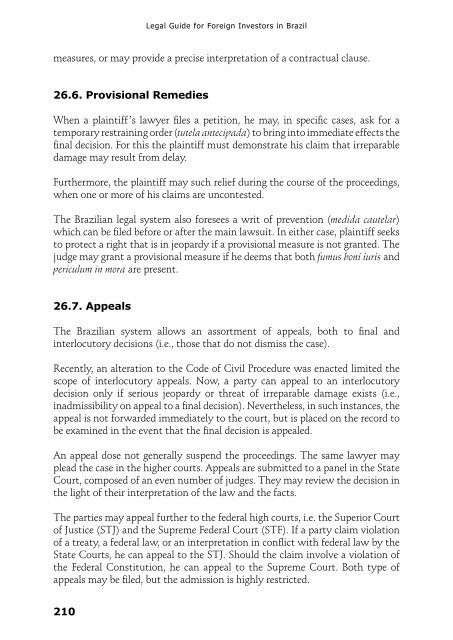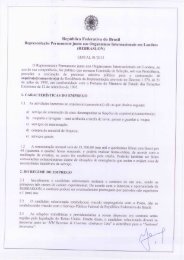Legal Guide for Foreign Investors in Brazil - Apex-Brasil
Legal Guide for Foreign Investors in Brazil - Apex-Brasil
Legal Guide for Foreign Investors in Brazil - Apex-Brasil
You also want an ePaper? Increase the reach of your titles
YUMPU automatically turns print PDFs into web optimized ePapers that Google loves.
<strong>Legal</strong> <strong>Guide</strong> <strong>for</strong> <strong>Foreign</strong> <strong>Investors</strong> <strong>in</strong> <strong>Brazil</strong><br />
measures, or may provide a precise <strong>in</strong>terpretation of a contractual clause.<br />
26.6. Provisional Remedies<br />
When a pla<strong>in</strong>tiff’s lawyer files a petition, he may, <strong>in</strong> specific cases, ask <strong>for</strong> a<br />
temporary restra<strong>in</strong><strong>in</strong>g order (tutela antecipada) to br<strong>in</strong>g <strong>in</strong>to immediate effects the<br />
f<strong>in</strong>al decision. For this the pla<strong>in</strong>tiff must demonstrate his claim that irreparable<br />
damage may result from delay.<br />
Furthermore, the pla<strong>in</strong>tiff may such relief dur<strong>in</strong>g the course of the proceed<strong>in</strong>gs,<br />
when one or more of his claims are uncontested.<br />
The <strong>Brazil</strong>ian legal system also <strong>for</strong>esees a writ of prevention (medida cautelar)<br />
which can be filed be<strong>for</strong>e or after the ma<strong>in</strong> lawsuit. In either case, pla<strong>in</strong>tiff seeks<br />
to protect a right that is <strong>in</strong> jeopardy if a provisional measure is not granted. The<br />
judge may grant a provisional measure if he deems that both fumus boni iuris and<br />
periculum <strong>in</strong> mora are present.<br />
26.7. Appeals<br />
The <strong>Brazil</strong>ian system allows an assortment of appeals, both to f<strong>in</strong>al and<br />
<strong>in</strong>terlocutory decisions (i.e., those that do not dismiss the case).<br />
Recently, an alteration to the Code of Civil Procedure was enacted limited the<br />
scope of <strong>in</strong>terlocutory appeals. Now, a party can appeal to an <strong>in</strong>terlocutory<br />
decision only if serious jeopardy or threat of irreparable damage exists (i.e.,<br />
<strong>in</strong>admissibility on appeal to a f<strong>in</strong>al decision). Nevertheless, <strong>in</strong> such <strong>in</strong>stances, the<br />
appeal is not <strong>for</strong>warded immediately to the court, but is placed on the record to<br />
be exam<strong>in</strong>ed <strong>in</strong> the event that the f<strong>in</strong>al decision is appealed.<br />
An appeal dose not generally suspend the proceed<strong>in</strong>gs. The same lawyer may<br />
plead the case <strong>in</strong> the higher courts. Appeals are submitted to a panel <strong>in</strong> the State<br />
Court, composed of an even number of judges. They may review the decision <strong>in</strong><br />
the light of their <strong>in</strong>terpretation of the law and the facts.<br />
The parties may appeal further to the federal high courts, i.e. the Superior Court<br />
of Justice (STJ) and the Supreme Federal Court (STF). If a party claim violation<br />
of a treaty, a federal law, or an <strong>in</strong>terpretation <strong>in</strong> conflict with federal law by the<br />
State Courts, he can appeal to the STJ. Should the claim <strong>in</strong>volve a violation of<br />
the Federal Constitution, he can appeal to the Supreme Court. Both type of<br />
appeals may be filed, but the admission is highly restricted.<br />
210









